Do you get the feeling of dread thinking about scuba diving in the dark? Does the thought of scuba diving at night scare the bejeezus out of you? Do you feel anxious with the idea of night diving?
Don’t worry. What you are feeling is totally normal. I am yet to meet a diver who hasn’t felt something similar to what you are feeling when it comes to scuba diving at night for the first time.
Even to this day, despite experiencing several night dives, I still get anxious getting in the water when it’s dark. Most often it’s because I let my crazy imagination get the best of me. When this happens I try to recall why I love night diving in the first place and those fears turns into excitement.
But what do you do if it’s your first time to do a night dive and you don’t know what to expect?
In this post, I will share with you some of the best night diving tips I have learned through the years. These diving tips will help you minimize your fear of scuba diving in the dark. By the end of this post, you should feel more ready and excited to go night scuba diving!
Here are 15 of the best night dive tips for first-timers:
- 1. Choose the right dive spot
- 2. Dive the site during the day to familiarize yourself with the area
- 3. Night dive in smaller groups and in less congested areas
- 4. Choose the right dive center and dive guide
- 5. Learn about the night time dangers and hazards
- 6. Always night dive with a buddy
- 7. Familiarize yourself with the night diving hand signals
- 8. Do your dive best practices
- 9. Start your dive at dusk
- 10. Equip yourself with proper night diving gear and safety devices
- 11. Wear proper protective gear for night diving
- 12. Leave the camera
- 13. Take a night diving course
- 14. Immerse yourself with night diving experiences of other divers
- 15. Be honest about your night diving anxiety
1. Choose the right dive spot
Selecting the right dive spot is important especially when you are doing a night dive for the first time. One that has little to no current on the surface and underwater would be the best. You will also want to choose an area that is easy to navigate underwater. Remember that you will only be diving with an underwater torch in your hand. You really don’t want to be accidentally bumping into things in the dark.
You should also do a shallow dive. A dive site where you can visibly see the bottom and not worry about diving beyond your limits would be a good choice for a first-night dive. I would recommend doing a shore dive with a gradual slope. Choose to go diving on very calm night so you don’t have to struggle getting in and out of the water. Most of my favorite night dives were done on a house reef where I could easily just walk in and out of the dive site.
I would also advise against doing your first ever night dive in a very unique dive location. For instance, you happen to be in Hawaii and there is an opportunity to do a manta night dive. Do a night dive first in a more controlled environment so you will know what to do next time. The manta night dive or any “special night dive” will be much more enjoyable when you’re already comfortable with night diving in general.
Choosing the right dive spot also means considering how far or near you are from civilization. In case of an emergency, you don’t want to be stuck in the middle of nowhere. Remember that many places close down at night so avoid doing a night dive in an area where emergency help can be limited.
2. Dive the site during the day to familiarize yourself with the area
Once you’ve determined where you will be doing your night dive, make sure to do at least one dive in the area during the day. This can help put you at ease.
Knowing you have been to the same spot before will lessen any unwanted surprises. Since it won’t be completely foreign to you, revisiting the same site at night can help with your underwater navigation.
3. Night dive in smaller groups and in less congested areas
If possible, when night diving for the first time, avoid dive sites that may have crowds. It can be very stressful to get mixed up with other dive groups or lose your dive buddy underwater at night. Due to the darkness, identifying other divers while underwater can even be more challenging.
The presence of other dive groups can trigger some scuba anxiety. You should avoid situations where you could get separated from your dive buddy or dive group, especially for your first night diving experience.
4. Choose the right dive center and dive guide
Equally important is choosing the right dive shop or dive center that will take you out on your first night dive. If the guide or the shop has substandard service then you might want to start looking for a different shop or guide to take you. I have encountered bad divemasters in the past and they have ruined dives for me.
I was very lucky to have done my first night dive with Coral Cay Conservation as they were very strict when it came to dive safety. I was paired with an instructor so I felt more confident about getting in the water at night.
Even if it’s not your first night dive and you are very confident with your skills, only go with a reputable dive shops.
Hire your own guide if you can, especially if you are night diving in a new area. It is always worth it to pay extra. This way you can lessen any dive tasks like navigating. If you are able to delegate some of the dive tasks to someone else, you can lighten your load and minimize your scuba diving anxiety.
I have learned that diving at night while following a dive guide is so much easier than having to do the navigation yourself.
5. Learn about the night time dangers and hazards
Another night diving tip you should do is to find out what dangers and hazards you might encounter to that specific area at night. Ask the local dive guides if there dangerous marine animals you should watch out for? Many harmful sea creatures are more active at night as they hunt. If you’re not careful and aware of your surroundings, you could get into an animal-related accident.
Aside from marine life, ask about potential environmental and physical hazards that you can encounter. Maybe you are diving in an area with a nearby fishing community. If it’s common for fishermen to head out at night to fish, you might need to be more conscious of potential boat hazards as you ascend.
6. Always night dive with a buddy
Always dive with a buddy and dive with someone you are already comfortable with. A bad dive buddy pairing can make or break your dive regardless if you do it during the day or night. If you’re night diving for the first time, I would recommend diving with a dive instructor who can hold your hand in the process if necessary.
Find a dive buddy whom you’ve already gone diving with before so communication is also easier.
Communication underwater is hard enough as it is. Communicating with someone new is equally challenging. And communicating underwater with someone new, in the dark, can be a frustrating experience.
7. Familiarize yourself with the night diving hand signals
Speaking of underwater communication, scuba hand signals are modified for night dives. Since you will most likely be holding an underwater torch on one hand, communicating underwater will be a little bit different.
You can check out this video to see how divers communicate during a night dive. Review them beforehand with your dive buddy so you will know how to talk and signal to each other underwater at night.
8. Do your dive best practices
Like in all your dives, make sure to plan your dive and dive your plan. Always go through your dive briefing and review your hand signals. Never skip your dive buddy checks before entering the water. Always be alert and be conscious of your surrounding. Remember your dive training, and believe that you’ve got this!
9. Start your dive at dusk
Another night diving tip that can help you with your scuba diving anxiety is to start your dive at dusk. If you’re feeling nervous about your first or even 100th night dive, you should consider entering the water just as the sun has set.
During this time there is still a bit of light in the sky and you’ll be entering the water with a bit more visibility. It won’t feel like you’re going in blind. This window right before night time will give you ample time to adjust and relax underwater.
10. Equip yourself with proper night diving gear and safety devices
If you want to be safe and have fun, equip yourself with the right scuba diving equipment for your night dive. Make sure that your standard dive equipment is working as they should. If you have new scuba gear, do not test them out for the first time during a night dive. It is so much easier to troubleshoot and adjust to new dive equipment in broad daylight.
Aside from the basic scuba dive essentials, you will need a good quality dive light to help you see underwater at night. Here are some of my recommendations for the best dive lights for recreational divers.
It is also advised that you bring scuba diving accessories like a secondary or backup light, a scuba tank marker light, a slate, a dSMB, a whistle, or emergency signaling devices.
If it’s your first night dive, you can usually rent these night diving gear from the dive shop. But check with them ahead of time if they have what you need. In my experience, it is usually just the dive torch they rent out for night dives.
If you want to buy your own dive light, you should get something that is reliable and sturdy. Do not scrimp on this as this will help you navigate in the dark. The last thing you want is the light failing on you because you were being cheap!
Look for a dive torch that has been tried and tested, has good lumens (brightness) rating, and can run for hours. While night dives normally run for 45 minutes to an hour, shallow night dives can give you more bottom time. You will also want a torch that can run for hours in case there is an emergency.
I would recommend something that is at least 1000 lumens, lightweight, and uses a rechargeable battery. My first dive light made use of 3 Type-C batteries and I had to switch out the batteries often which I hated. It was not environmentally friendly and it was very heavy! Since I carry my underwater camera while diving at night, I use my Big Blue video lights as my main light.
Check price of Big Blue dive light on Amazon

Check price of Orcatorch scuba dive light on Amazon
You can also take a secondary light as your backup. It doesn’t have to be as bright as your primary light, but it’s something you’d want to have in case something happens to your main light. Don’t forget to always fully charge both your primary and secondary dive lights before any night dive.
Another night diving accessory you can take are dive tank lights or markers. These are basically tiny lights that serves as a beacon for divers in the water. They’re not meant to illuminate an entire area but rather to help fellow divers spot each other in the dark. Most dive shops will not provide dive tank lights, so you’re more than welcome to bring your own for you and your buddy.
Check the price of water-activated flashing marker light on Amazon

Check the price of waterproof emergency dive light on Amazon
Some divers carry chemical glowsticks but I would reconsider this option because of the environmental impact of these single-use light source. Instead, you can get reusable dive tank lights that automatically lights up upon contact with water. You can also get ones that have replaceable batteries. These two options are more eco-friendly than the one-time use chemical glowsticks.
Dive Slates may also come in handy if you need to communicate with your dive buddy underwater. Sometimes there simply no hand signals that can be used to express what you want to say underwater. Using slates to write on can help you get your message across more clearly.
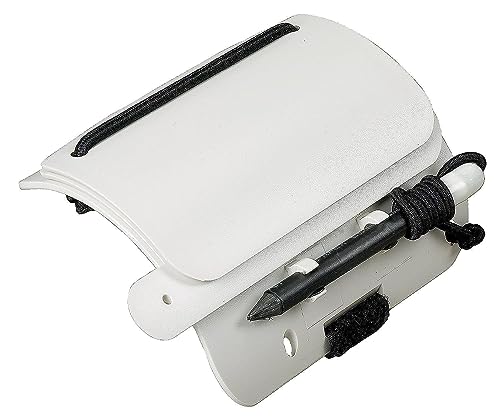
Check price of Dive Rite Slate on Amazon
I recommend getting one that is compact and won’t get in your way. I like this wrist-type slate because it frees up both your hands to hold your torch one hand and the other for writing.
Another night diving accessory that you should have is your dSMBs and other signaling safety devices like a whistle. The sea can be unpredictable and you never know where it can take you. dSMB can help boats spot you while you’re in the water so get one with reflectors. In the dark, the sound from your whistle can help rescuers locate you. Take these with you in any dive, night or day. You will be glad you have them with you especially during an emergency situation.

Check price of Dive Smart dSMB set on Amazon
11. Wear proper protective gear for night diving
Another important night diving tip you should follow is making sure that you have the right protective suits. You’d be surprised with how quickly the water temperature changes as soon as the sun disappears.
During a night dive, divers move more slowly to avoid hitting anything in the dark. Naturally, you will be using less energy and producing less body heat compared to a dive where you’re finning and moving like crazy. Wearing an extra layer like a hooded vest can keep you warm in the colder water at night.
Feeling too cold during the dive can make your night dive uncomfortable and unpleasant. You might end up wanting to end the dive early simply because you’re shivering. So layer up!

Check price of Scubapro Hooded Vest on Amazon
Wearing the proper suit can also protect you from dangerous marine animals. Full suits instead of shorties or regular dive skins can give you extra protection from animal-related injuries. In my experience night diving in the Philippines, there are more venomous sea creatures like lionfishes, octopus, urchins, fireworms, stargazers, and the like that show up when it is dark.
Another night dive tip: Make sure that you have a warm towel or dry off as soon as you get out of the water. The air can get extra chilly at night and you could feel colder from the wind exposure. I have had a few night dives where I forgot to bring a towel on the boat and my teeth were chattering all the way back to shore.
12. Leave the camera
Regardless of how experienced you are, if you’re diving at night for the first time, do not bring your GoPro or camera with you. You don’t want to be multi-tasking or task-loading during your first night dive. Cameras can be a distraction and can cause you to make mistakes in the dark. Just enjoy the moment. Focus on your first night diving experience.
When you’re ready to advance your skills, check out my underwater camera recommendations for beginners to help you document your next night dive!
13. Take a night diving course
One of the benefits of scuba diving is that there are always some additional dive lessons you can take. A night diving certification is not required to go on a night dive. However, taking a night diving course can help you overcome scuba diving anxiety.
PADI offers a Night Diver Specialty Course, while SSI has a Night Diving and Limited Visibility Course. Other dive agencies will have their own version so get in touch with your favorite dive instructor for their recommendation and advice.
If you are working towards your Advanced Open Water certification, you can also choose night diving as one of the Adventure Diver courses. For PADI Advanced Open Water Diver, you are required to complete 5 adventure dives so Night Diving can be one of them.
Having the additional knowledge and skills that a night diving course provides can be beneficial for any diver who has night dive jitters. It will give you the confidence to finally go diving at night.
14. Immerse yourself with night diving experiences of other divers
Another night diving tip I highly recommend for first-timers is to talk to other divers about what they can expect during a dive. Each person’s night diving experience is different. Collecting insights from people who “have been there and done that” can help you overcome scuba anxiety.
In the age of social media and the internet, there are so many blogs, videos, photos that you can find online to show you what night diving is like. These types of media can give you a glimpse of the wonderful things you can expect while scuba diving at night.
The unknown is usually what scares us the most so the more you know, the more prepared you can be. I personally find it helpful to read about things that could go wrong. It gives me the confidence that should it happen to me, I would have an idea on how to respond.
Read my post: What Is Night Diving Like? Where I narrate about the first time I went night diving, as well us stories of problems I encountered while diving in the dark.
15. Be honest about your night diving anxiety
If you’re feeling uneasy about the night dive, express your worries with your dive buddy and dive guide. Never lie about your experience or lack thereof. Talk about it, instead of keeping your concerns to yourself. Usually hashing it out with someone can help you overcome any doubts and fears of scuba diving at night.
Remember that any given time, you can always say no and sit the dive out. Even if you are already in the water or halfway through a dive, if you are not comfortable with the situation communicate this to your dive buddy or dive leader. Abort the dive if you have to.
Your safety and comfort should always come first.
Pin this night diving tips for later!
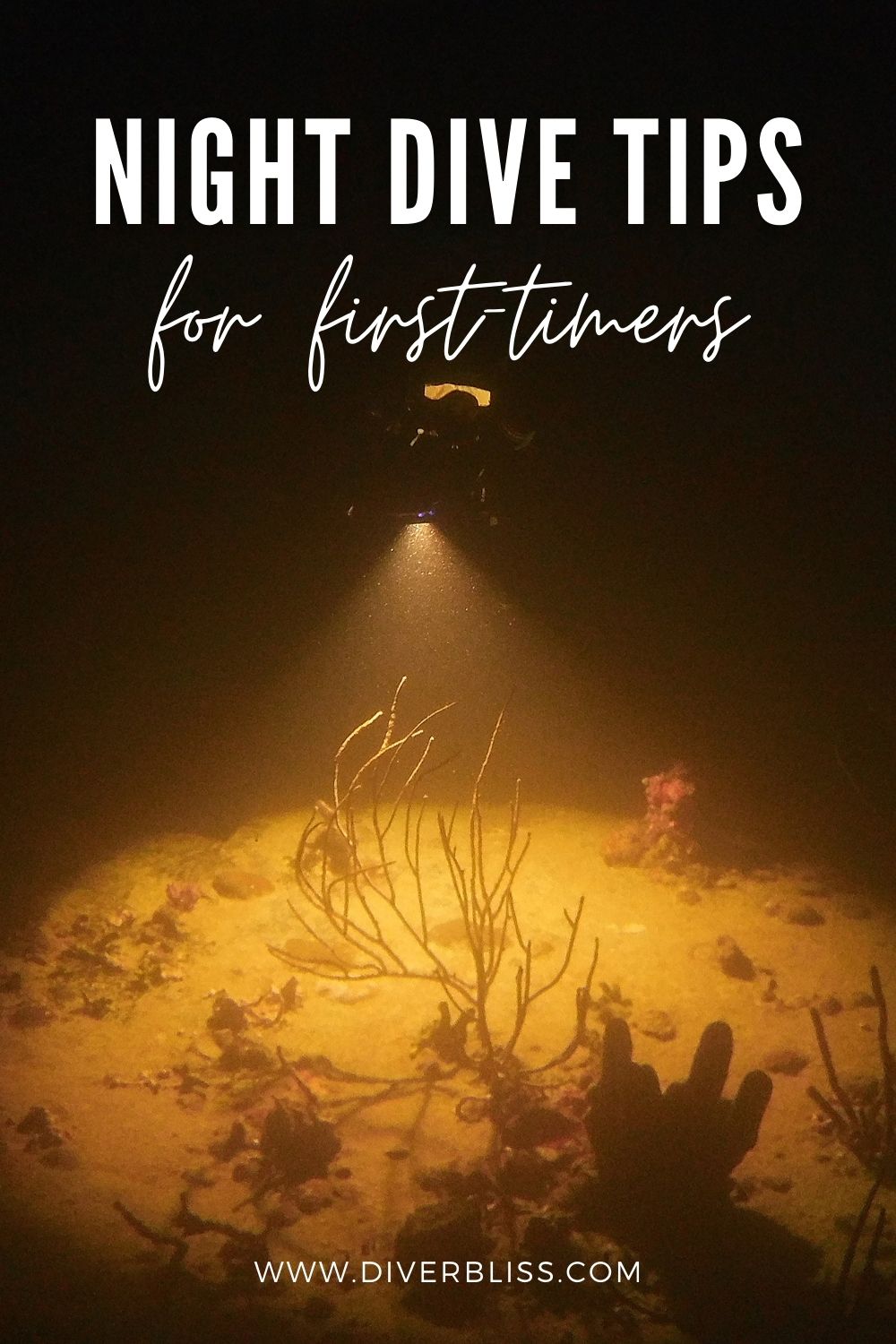
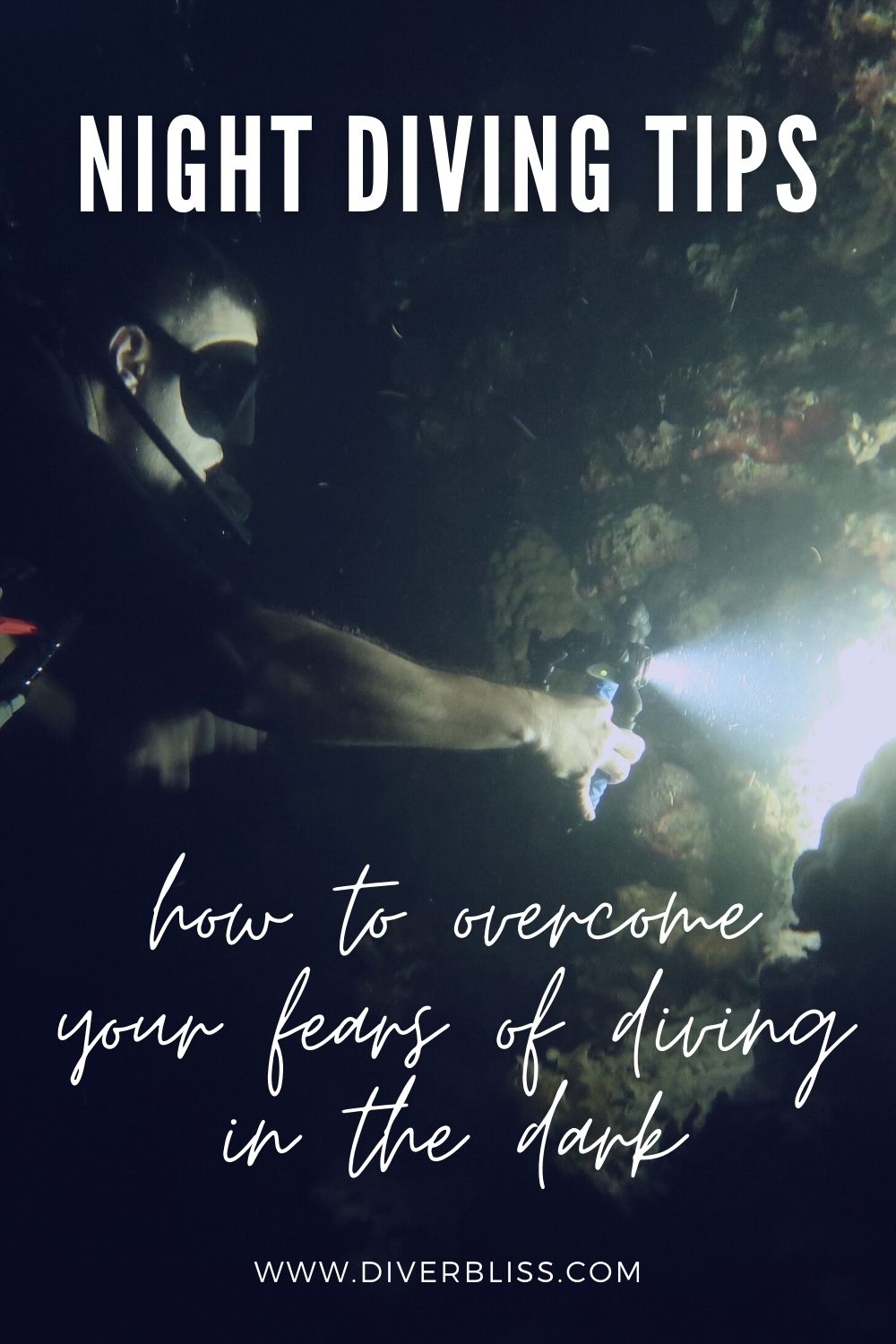
I hope by now you have more confidence to try this awesome type of diving. Night diving is absolutely one of my favorite things to do in the ocean so I hope these night diving tips will help you enjoy and love it too!
What scares you the most about night diving? If you have done night diving before, what tips do you have for divers who need help overcoming scuba anxiety especially during a night dive? Leave a comment below!
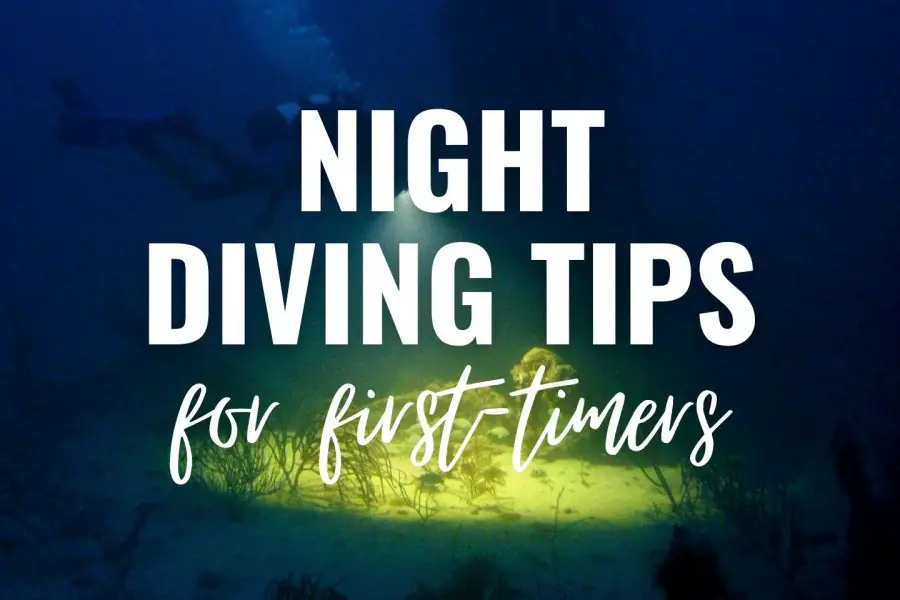
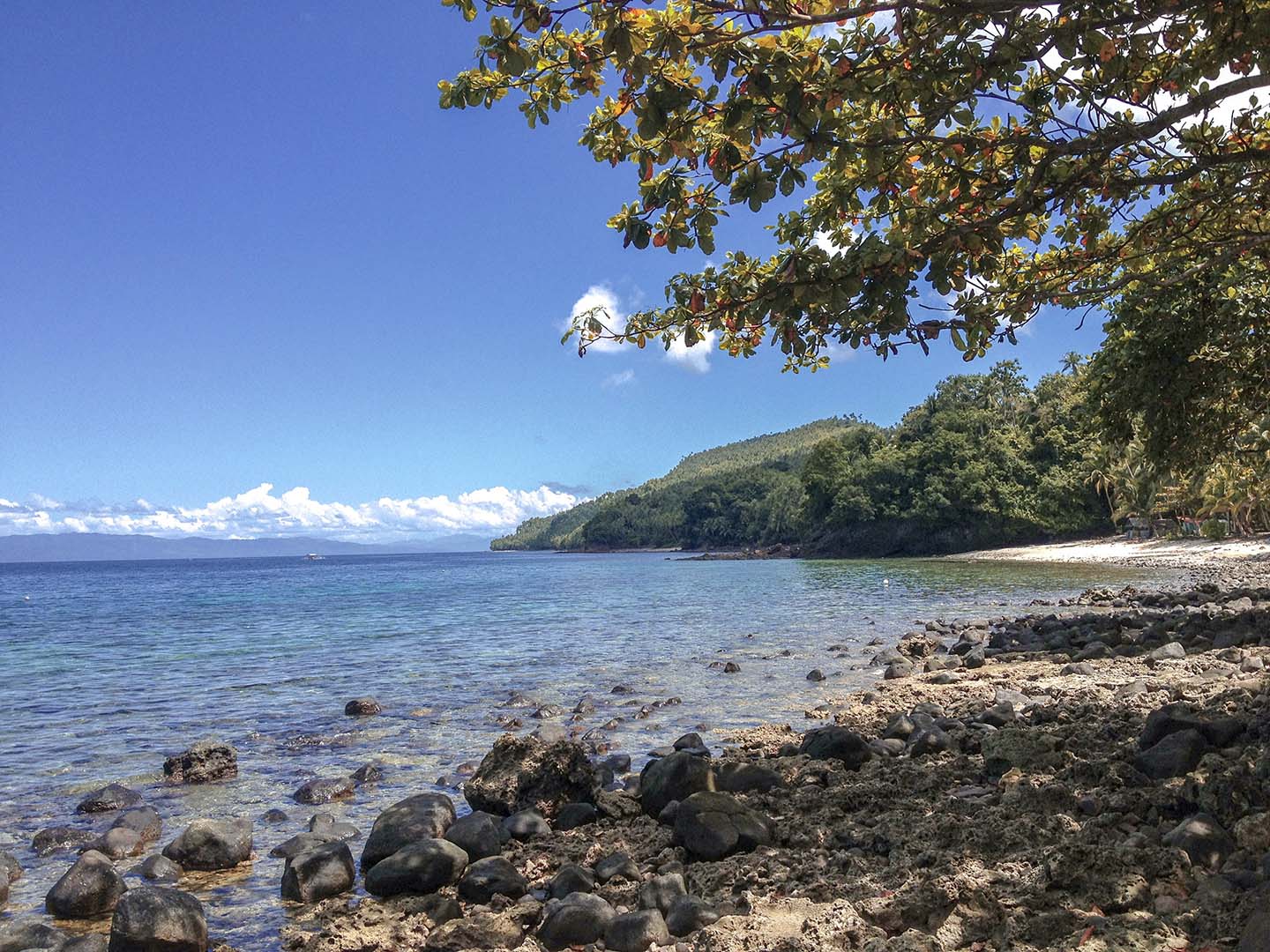
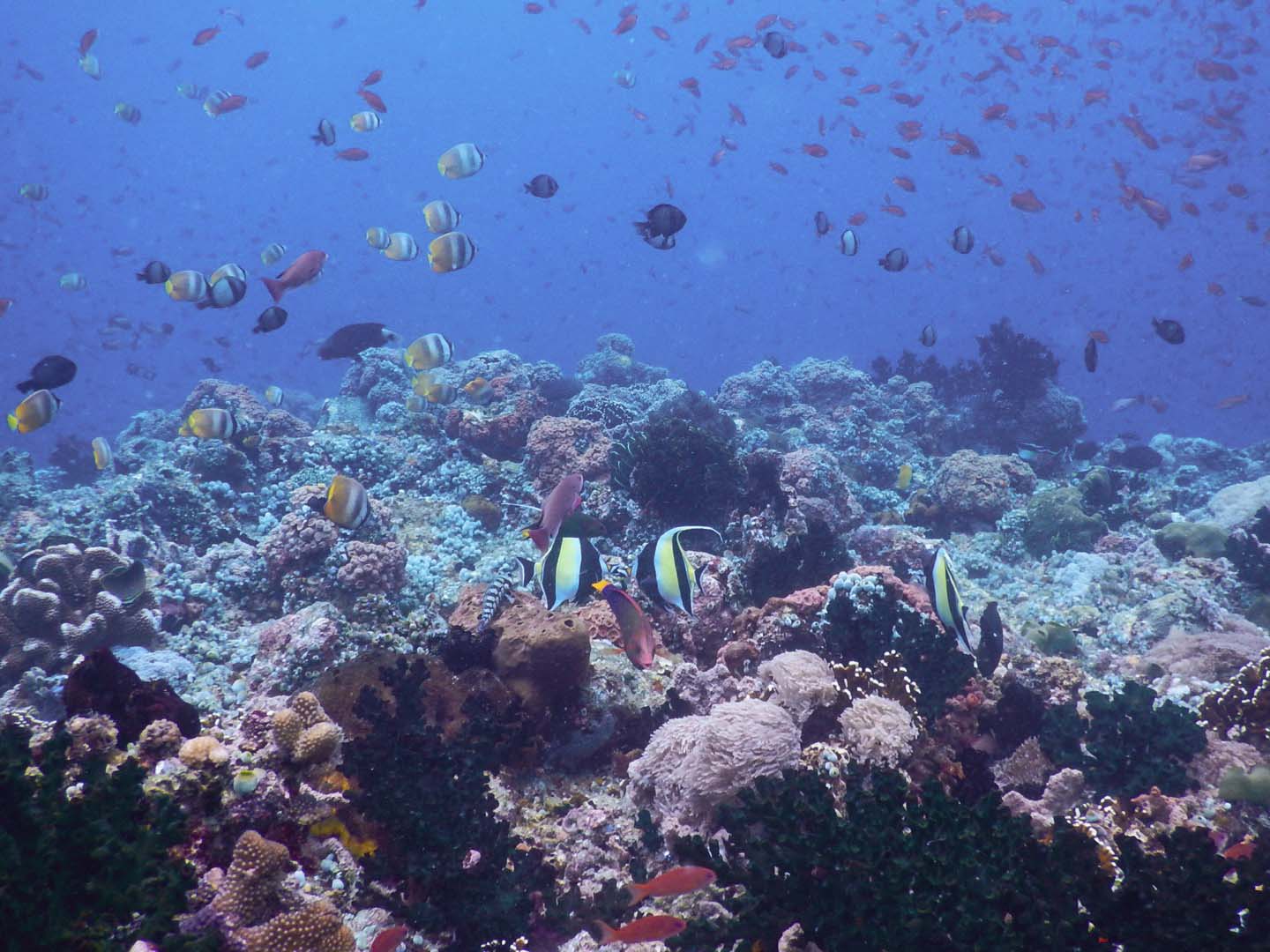
It sure was nice when you said that first-timers must consider speaking with other divers so they could collect insights from others. My husband and I will surely consider this because we are interested in getting a scuba diving certification. We want to definitely know what should be our expectations so so we can prepare accordingly.
I’m glad you found that particularly useful! 🙂 Good luck with your certification! 🙂